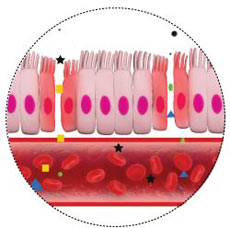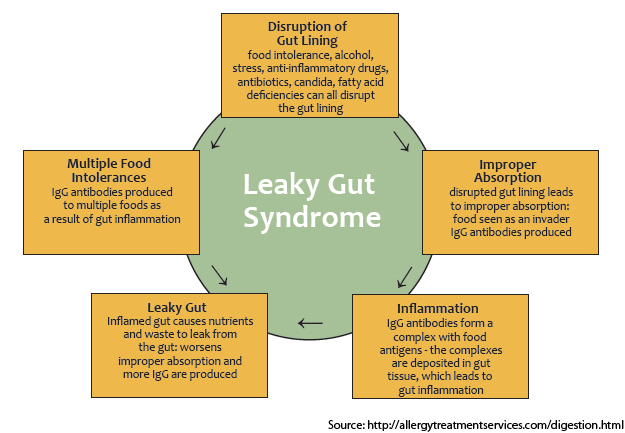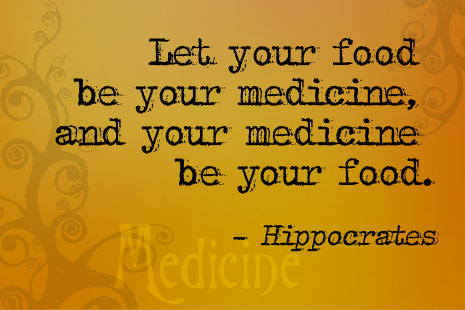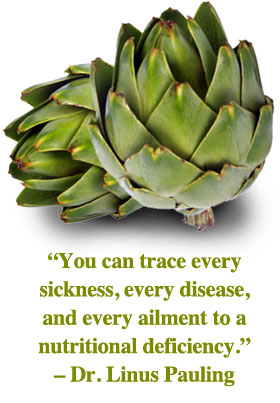What is Leaky Gut?
Learn about leaky gut syndrome and intestinal permeability. Understand the symptoms, causes, and treatments available for those who suffer from his debilitating ailment.
When partially digested food, toxins, and bacteria pass through the small intestine and enter the bloodstream, this is referred to as a condition known as leaky gut syndrome, or LGS. In simple terms, large spaces occur in between the cells that compose the wall of the gut. Since these spaces exist in the gut wall, bacteria, toxins, and food can find their way into the bloodstream.
 When the gut wall or intestinal lining is damaged due to leaky gut syndrome, damaged cells called microvilli become unable to do their job properly. Therefore, they can't manufacture the enzymes that are vital to good digestion. So, digestion is impaired, absorption of nutrients is effected, and damaging substances are able to invade the bloodstream. How does the body respond to the “foreign invaders” that have entered the bloodstream? It responds with inflammation, allergic reactions, and other unpleasant symptoms.
When the gut wall or intestinal lining is damaged due to leaky gut syndrome, damaged cells called microvilli become unable to do their job properly. Therefore, they can't manufacture the enzymes that are vital to good digestion. So, digestion is impaired, absorption of nutrients is effected, and damaging substances are able to invade the bloodstream. How does the body respond to the “foreign invaders” that have entered the bloodstream? It responds with inflammation, allergic reactions, and other unpleasant symptoms.
Well now, what harm is a bit of inflammation and some allergic reactions? This may sound relatively innocuous to some, but this condition is thought by some experts to contribute to numerous serious diseases. Since the immune system becomes overburdened by toxins that enter the liver, the toxins are flushed back into the blood where they are sent to connective tissues and muscles. Can you see how some of the above diseases might develop? Leaky gut syndrome may have a hand in the following conditions: allergies, inflammatory bowel, Crohn’s disease, fibromyalgia, chronic fatigue syndrome, diabetes, arthritis, pancreatic dysfunction, giardia, irritable bowel syndrome, and lupus.
What Causes Leaky Gut Syndrome?
Some experts contend that the most common cause of this condition is ingesting foods that one is allergic to. Interesting, isn’t it? This begs the question, “what comes first, the chicken (allergies) or the egg (leaky gut)?” However if these particular experts are correct, then common allergens like dairy products, wheat, and eggs will contribute to leaky gut. Click here for more about food allergies.
 Of course, it is possible (and likely) that other factors contribute to leaky gut syndrome as well. Aside from the possibility that ingesting allergens causes this condition, it is thought that the following issues can cause this ailment:
Of course, it is possible (and likely) that other factors contribute to leaky gut syndrome as well. Aside from the possibility that ingesting allergens causes this condition, it is thought that the following issues can cause this ailment:
• Diets that consist of refined sugar
• Diets that are too low in fiber
• The use of some drugs, including antibiotics
• Parasitic infections
• Poor digestion
• Candidiasis
• Inflammatory bowel disease
• Pathogenic bacteria
• Nonpathogenic bacteria, such as Klebsiella or Pseudomonas
• Zinc deficiency
• Alcoholic beverages
• Nonsteroidal anti-inflammatory drugs such as aspirin and ibuprofen
Whether or not leaky gut is the cause of various states of disease, or whether it indirectly exacerbates those conditions, we know that a variety of symptoms are associated with intestinal permeability. These leaky gut syndrome symptoms include:
- Nutritional deficiencies - LGS usually causes a deficiency of minerals in the body
- Candidiasis- Candida is a normal fungus that lives in our digestive system. When it outnumbers the other bacteria that reside there, symptoms such as fatigue, allergies, bloating, and carbohydrate cravings can occur
- Allergies - With LGS, otherwise harmless substance travel through the gut and into the bloodstream, where they become antigens (foreign invaders). The body attacks them and it attacks healthy tissues in the process
- Anxiety - A symptom related to candida overgrowth
- Skin rashes - The body's larges organ performs the job of eliminating toxins. Rashes may be related to the skin's ability to conduct detoxification
- Impaired immune function
- Impaired memory - Remember the friendly and unfriendly bacteria in the gut. There are dangerous byproducts of the unfriendly bacteria, such as ammonia, that are detrimental to brain function
- Moodiness or irritability
- Bloating or flatulence
- Fuzzy cognition or poor concentration
- Diarrhea and constipation - This relates to irritation of the colon. Stagnant waste putrifies and an overgrowth of bacteria and parasites can occur.
- Fatigue
- Headaches
The Intestines and Micro-Flora
Believe it or not, about 3 1/2 pounds of bacteria micro-flora organisms live in our intestinal tracts! Some of these bacteria are good or "friendly," and other bacteria create problems for the body. The “friendly" bacteria are known to enhance immunity, help to heal gut infections, and they reduce the amount of toxic by-products in the bowel. The most important “good bacteria” in your diet is lactobacillus acidophilus and bifidus.
Lactobacilli (acidophilus) reside mostly in the upper small intestine, while bifidobacteria prefer the lower small intestine and large intestine. So why do these critters reside in our guts? Because they are our defense system.
When friendly microflora attach themselves to the cell wall of our gut, they occupy valuable “real estate” so that unfriendly flora can’t move in. They establish themselves in the "neighborhood" and do a very important job; and they never take a day off! The typical metabolic activities of normal intestinal flora consist of:
• Production of vitamins such as B12 and Folic acid
• Synthesis of short chain fatty acids
• Production of enzymes such as lactase
• Detoxification
When there is an imbalance between the friendly microflora and unfriendly (a condition called dysbiosis), serious health issues can arise. An imbalance of microflora can contribute to: nutrient deficiencies, allergies, infection, cancer, toxicity, and impaired metabolism. Therefore, if an imbalance of microflora exists, you definitely want to look into the proper methods of treatment.
Leaky Gut Syndrome Treatment
Rather then treating the superficial symptoms associated with leaky gut syndrome, we feel it is more prudent to choose a course of leaky gut syndrome treatment that will focus on healing the gut. There are several different paths to healing a leaky gut. Some of the primary ones found by research are as follows: removing candida yeast and parasites, the use of digestive enzymes, using probiotics , proper diet, and nutritional supplements.
Candida and Parasites:
Much of the literature on leaky gut syndrome contends that the main cause of this condition is candida, a yeast-fungal organism that grows roots through your intestinal tract; roots that go searching for food. These roots compromise the intestinal lining and can cause leaky gut! We must, therefore, launch a concerted attack on the candida. The following natural treatments are suggested to combat candida:
- Probiotics - A professional strenght, high quality probiotic.
- Caprylic Acid capsules
- Pau D’Arco
- Colloidal Silver
- Fresh Garlic Cloves
Diet Restrictions:
First, it is wise to eat high fiber foods, including uncooked vegetables, whole grains, wheat bran, and legumes. The fiber helps to clean the colon and remove layers of debris which may contain detrimental microorganisms.
Doctors will assume candida infestation is present if patients have taken antibiotics on a regular basis, so we suggest eliminating the foods that candida needs to thrive. Avoiding sugar and white starches will help to correct leaky gut syndrome. The sugars to avoid include fructose, honey, molasses, and simple carbohydrate/snack foods such as potatoes, chips, cakes, cookies, desserts, sodas, fruit-juice and ice-cream.
- The white-starch foods to avoid include: white bread, cakes, pasta (unless it’s whole grain), white rice, potatoes, and all refined flours.
- Fermented Products: Avoid products that have been fermented or contain yeast. This includes bread, alcohol, soy sauce, and vinegar.
- Fungal Products: Avoidmushrooms, cheeses, and kombucha.
- Fruit and fruit sugars: Avoid fruit and fruit juices until candida has been brought under control. Honey should also be avoided at the beginning of your anti-candida diet, then reintroduced later.
Nutritional Supplements:
- Fatty Acids - Increase your consumption of essential fatty acids/healthy oils. You may take supplements that contain fish oils, flax-seed oil, borage, and evening primrose oils. Take one tablespoon or three capsules of these oils, twice daily.
- Ingredients that can help to heal intestinal mucosa. These include: gamma oryzanol, L-glutamine, N-acetyl-D-glucosamine, gamma-linoleic acid and phosphatidyl choline.
- Olive leaf extract
- Grapefruit Seed Extract
- Caprylic Acid
- Garlic
- Oil of Oregano
- L-Glutamine
Bowel Cleansing:
Our intestines are exposed to a multitude of harmful substances, including antibiotics, protozoal parasites, food-borne transmission of parasitic and bacterial organisms, and processed foods containing refined sugars. So how do we go about choosing detoxification products that will facilitate natural cleansing and detoxification?
There are detoxification products that contain special types of fiber that help draw out old fecal matter from your bowel as effectively as a powerful vacuum. Psyllium seed and husk is a highly recommended fiber that will perform this bowel cleansing function. It can potentially bind 40 times its own weight in toxic material and draw it out of the colon. Citrus pectin is another effective fiber choice which can nourish the colon and improve bowel mucosal structure.
Digestive Enzymes:
A supplement containing digestive enzymes will help to lessen some of the symptoms associated with leaky gut syndrome. As we age, it is common for our production of digestive enzymes to decrease. It is wise to consider utilizing these substances which help to digest proteins, fats, and carbohydrates.
There are many digestive enzyme supplements on the market. These supplements can improve the absorption of nutrients from the gut and prevent partially digested proteins from being absorbed and overworking the liver.
The body can also obtain important enzymes from certain foods. However, food enzymes are quite sensitive to heat, so ingesting raw salads, vegetables, and fruits, is recommended. Foods recommended for their enzyme content are pineapples, papaya, avocados, mangos and bananas. Sprouts are also a good source of digestive enzymes.
Probiotics:
Probiotics is a term that refers to factors you can add to your diet that enhance the “friendly bacteria” that live in your intestines. They are known to enhance immunity, help to heal gut infections, and they reduce the amount of toxic by-products in the bowel. The most important “good bacteria” in your diet is lactobacillus acidophilus and bifidus.
In order to prevent an overgrowth of disease-associated micro-organisms such as E-coli, your intestinal tract should consist of approximately 85 percent of this friendly bacteria. When the 85% ratio of good-to-bad bacteria is not present, harmful bacteria outnumber the good and dysbiosis can occur. What follows are symptoms such as poor digestion, flatulence, bloating, and vomiting.
Probiotics are very beneficial for treating digestive problems such as dysbiosis, leaky gut syndrome, and various harmful intestinal bugs. They inhibit the colonization of yeast and fungus, so they are useful for treating candida, a frequent component of leaky gut. Lactobacillus helps us to digest proteins and helps us to absorb vital nutrients. Also, when antibiotic use has damaged the intestinal flora, Probiotic supplementation is especially helpful in restoring the gut to a health balance of friendly vs. harmful bacteria; a balance that promotes gut lining health by decreasing intestinal permeability.
Remember, leaky gut is a result of the gut lining becoming inflamed due to food intolerances, drug ingestion, bacterial and viral infections, and stress. This inflammation produces gaps in the gut wall which allow macro food particles and other foreign microbes to enter the body and create an immune response. This can result in allergies, it further exacerbates food intolerances, and it possibly triggers autoimmune diseases. Therefore, focus on each of the five treatment categories above and you may experience results that approximate a leaky gut syndrome cure.





